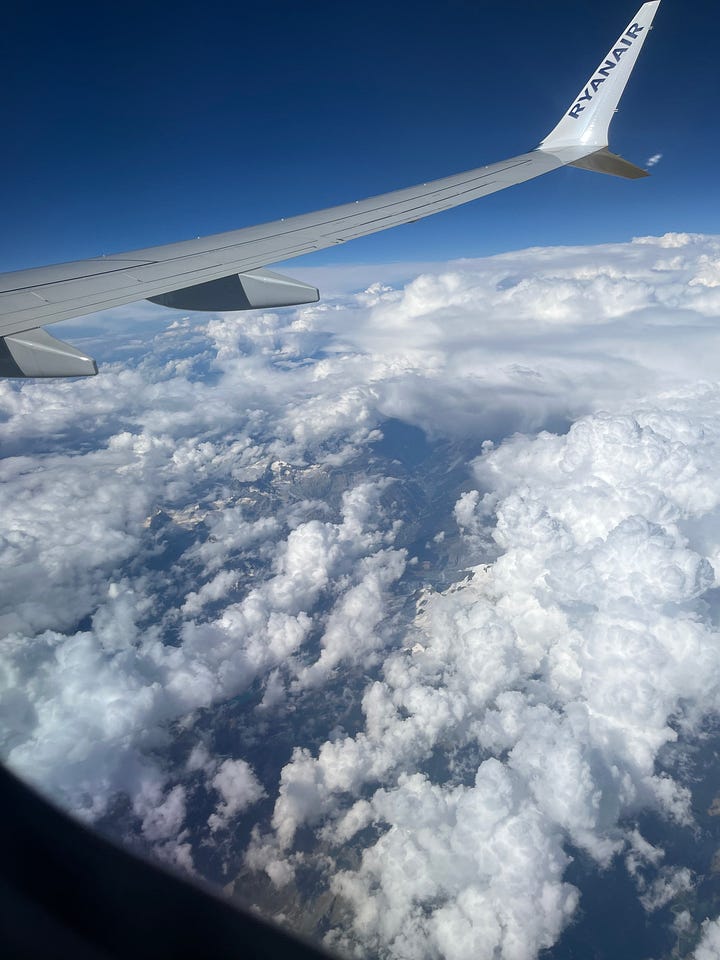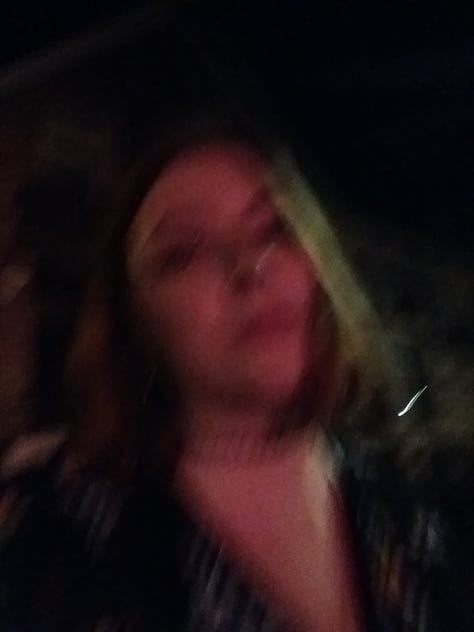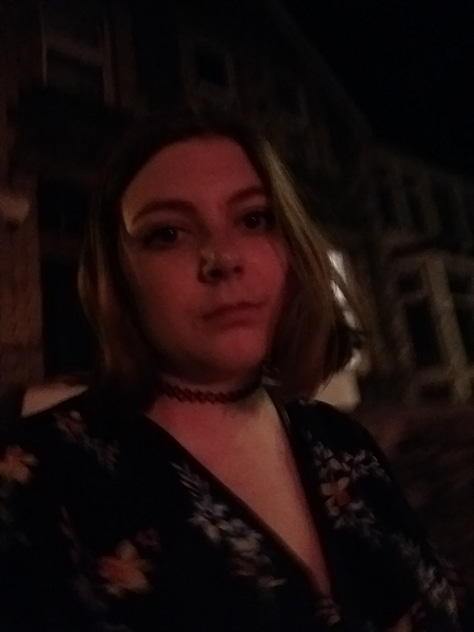

Last summer, amidst a series of terrible things, I became briefly very very obsessed with the MUNA song, ‘Runner’s High’. I was thinking almost constantly about leaving. Quitting my job, leaving my flat and my friends, running away. I think the idea of that rush the song describes really spoke to me — an adrenaline rush, or maybe just relief. In my early twenties, I used to look up flights on bad days, fantasising about spending everything to run off to some metropolitan city on the continent and live the sort of lackadaisical, bohemian expat life that has probably not been possible for anyone without substantial generational wealth for several decades. It’s easy to analyse — I was afraid and after a sense of control. Leaving can seem more dignified sometimes, a way to assert yourself upon the universe, to refuse to be someone to whom things keep happening. As if you could simply take yourself out of the game and away from mistakes, failures, abjection.
Abrupt exits always bring a thrill. Especially when it’s your choice, and you are riding the high of your own impulse, rather than free-falling during an unexpected crisis. They are an imperfect thing. How can you ever know you’ve made the right decision? Maybe that uncertainty is part of what makes it so exciting. You have done something decisive and irrevocable. Maybe it was cowardice, maybe it was instinct. Sometimes there’s only a hairline between maladaptive actions and helpful ones. Sometimes you’re doing things for both bad and good reasons.
I want to believe in the value of therapy, but sometimes it does feel like running into the same wall over and over again, waiting for it magically to give way one day. The thing that comes up for me over and over again is my tendency to intellectualise. For a long time, I thought I was very emotionally intelligent and just somehow terribly cursed, always suffering such difficulties. But thinking things through does not resolve matters of the emotional world — you actually have to feel your feelings. Or so I keep being told. It’s something I’m more on board with in theory than in practice. Intellectualising is another way to run — away from the moment, away from your feelings, out of your body and into your head.
It’s useful to detach in times of distress. We all have to cope somehow, keep paying the rent and spin all the plates of our difficult lives. I've had extremely unpleasant experiences of dissociation, but equally, it’s been useful or even pleasant to me at times. It’s a false sense of strength — the feelings are still with you, buried — but to disconnect from distress and carry on with life can feel powerful. Sometimes I’d feel drunk with it, staring down at my life as if from above, watching time skip and stutter, laughing as everyone gave me worried looks, too foolish to understand what I felt to be true in the moment, which was that none of it mattered at all. If nothing is real, then the consequences aren’t either. At that time, my dream life was more vivid than reality. I slept a lot, though not much at night, and in waking hours gave myself almost entirely over to daydreaming. For me, daydreaming works best in motion, so I’d walk circles in the city to immerse myself in the barely-real world.
If you can’t run away from your distress in a crisis, you can always try to avoid one in the first place. Isolate yourself, hold people at a distance, run at the first hint of trouble. I tend to do a lot more fleeing than fighting. Call it the go-to of the avoidantly attached.
Still, I do think it’s important to know how to run. I think of a line from one of di Prima’s Revolutionary Letters - ‘splitting is an art, frequently called upon in revolution’. It’s important, for example, not to leave a protest alone, especially where there is large or aggressive police presence: like any social animal, you’re most vulnerable when separated from the pack.
Running is spiritually necessary too, at times. I loved this piece by Gabrielle de la Puente about chronic illness and desire and running away. My own Long Covid is a lot better at the minute, though I know this reprieve might not last at all. When you’re sick and the only power you have is to pace yourself, it can feel like such a personal failure when you overdo it. Caring for yourself becomes a responsibility with higher stakes, and when you fuck up, it feels shameful. You are risking your welfare, inconveniencing everyone, perhaps even risking your income. I appreciate that de la Puente makes a case for the value of such a risk. She writes:
It wasn’t going to be a very good idea for my body if I went… but that is why going was so fun. I slept a lot, sweat through clothes, and felt like I’d been beat up. It was illogical and good, the pain a new sign of resistance. [...] this time I was making that decision instead of having the decision made for me.
I think sometimes running is the only means you have to grasp a little autonomy. And I think pleasure is wildly understated as a motive in much of life. Especially pleasures that come with some kind of risk or vulnerability, or perhaps just pleasures that are imagined by some to be morally degenerate. We pathologise ‘bad’ decisions too readily. I think of conversations I’ve had with those on the prudish end of the spectrum, their astonishment at why people would do all number of things: kissing strangers at nightclubs, having casual sex, taking drugs, shoplifting, lying, cheating etc. Often, the answer is that it feels good in some way. Even if — or because — it is bad, or dangerous, or forbidden.
I think of Olli and I drunk-philosophising while stir-crazy in that hellish first lockdown winter — we thought about the difference between comfort, which we declared safe but sometimes defensive and paranoid, and pleasure, which we thought generally required some kind of surrender of control. I’m not sure how much I’d agree with that cut-and-dry view now, but I am interested in the notion of surrender as a pleasurable experience.



In the last year that I lived in Cardiff, towards the end of my worst period of dissociation, I spent a lot of time walking alone at night. People’s reactions to this confounded me. Yes, it was true, I did not value my life very much. But I was also choosing my pleasure over my safety, and even then, making a calculated decision knowing what a safe city it tended to be. It was spring, and then summer. I liked seeing the castle at golden hour. I liked to be wrapped in the cool night air, I liked the green scents of the park in the breeze. I liked to hear the noise of the city waking from winter slumber, everyone behaving like love and life were possible again. I had lived there for almost four years. I walked through the emptying night along streets where I had once cried, danced, thrown up, laughed, argued, been cat-called and harassed and even chased by strange men. When I told people I would walk any distance home from the pub, the park, the party, many acted like I was making the most reckless decision I could. I hadn’t remotely recovered from any of the difficult things that had happened, I think I still seemed caustic and raw and fraying. Pulling myself together was taking its time. And maybe it was just easy to be careless by then — the worst had already happened. If I could be harmed in my own home, what could be worse in the open street?
It irritated me to be patronised. (It always does.) I resented the implication that I lacked an instinct for self-preservation. At a party that Halloween, I’d spent the whole night shivering in the garden because the house smelled of gas, and no matter how the hosts reassured me of its safety, telling tall tales of inspections and tests and gas company promises, I wasn’t willing to risk it. I trust my nose.
I suppose the point I’m trying to make is sometimes putting yourself in ‘danger’ is its own kind of self-preservation. I needed to be in the world, I needed to feel its magic. I needed to practice taking even the smallest of risks, to feel some pleasure and remind myself why it might be worth it.
Something I’ve thought a lot about lately, in therapy and out of it, is my problem with managing uncertainty. Sometimes running away is a grasp for certainty, a way to avoid standing still and feeling your discomfort. But equally, I think I’ve often stayed where I shouldn’t from fear of the unknown I would have to step into. There are kinds of suffering that can feel comfortable in their familiarity. I thought about this a lot last year when I read Women Talking, and found myself moved and a little unsettled by Ona, the strange, dreamy idealist among the group. In the novel, a group of Mennonite women sit together, debating how to respond to endemic sexual violence in their community: whether to stay and fight — not really an option with their pacifist beliefs — or to leave, or to do nothing. Ona says something in favour of leaving that stayed with me: “... hope for the unknown is good, better than hatred of the familiar.” I used to think of myself as a dreamer and an idealist, especially as a child and teenager. I worry now that the world has hardened me, that I have let pain make me angry and callous and fatalistic. I had a rough winter, though in the last few months, I’ve felt better than I have in a long time, not least because I’ve felt traces of that childhood version of myself again, earnest and tender and hopeful. I want to be the kind of person who sees the unknown as an invitation and dares to imagine the beauty it might bring.
We need to believe in what we can’t know and see. How do we build anything better in this world if we aren’t running up to the horizon of our imagination, straining to picture a world we cannot yet understand? We have to refuse familiar miseries and venture into the unknown. Ursula K. Le Guin’s most famous short story, ‘The Ones who Walk Away from Omelas’, imagines an almost perfect civilisation, a city of harmony and happiness and pleasure, all entirely predicated on the continued suffering of one child, locked away without clothes or kindness or dignity. I was quite amused by how it was discussed in the documentary about her life, The Worlds of Ursula K. Le Guin, which understood the allegory, but imagined it as a sort of thought experiment — would you stay or would you go? I don’t think there is any uncertainty in Le Guin’s story; she understands that if your life — your society — is built on suffering, the only just and brave choice is to refuse it and build something new.
I want to refuse misery. I’m trying. In the small realm of my own life, perhaps I’m succeeding a little. Everything has become quite uncertain. I don’t know what I’m doing, but I’m learning to bear it. I want to figure out how to tolerate the discomfort that comes from seeking the things I actually want, instead of soothing myself with short-term comforts that dissatisfy me in the end.
Maybe the point is less about learning not to run away and more about learning when to — chasing adventure instead of hiding from fear, choosing uncomfortable pleasures over comfortable misery. I can find those pleasures in flight sometimes, but at other times I have to stay and sit with the present moment. Call it radical acceptance. There are some things — feelings, mostly — that I’ve been trying to outrun for most of my lifetime. Here, I think it’s good to lean on clichés — humble yourself through the unstylish cringe of it all. There is a therapeutic maxim I’ve thought of a lot recently, particularly after watching this lecture on shame and self-acceptance — “What you resist, persists”. You cannot deny your feelings. As my best friend reminds me often: the only way out is through.
Surrender is mortifying but often worth it. I’m not sure what has changed, but as I’ve stopped grasping for control or certainty or a quick escape, I’ve been reminded of the astonishing beauty of this life. The world is an exciting, interesting place. I am glad to be alive in it. Maybe there isn’t a shortcut out of pain, but the world is still out there, whether or not you’re sleeping soundly through the night. Curiosity is one of the greatest balms to suffering. I regret the years I wasted worrying about everything I couldn’t control, totally forgetting to play! I love life best when play is a priority; I love to laugh and dance and learn and talk myself hoarse.
In the end, I’m not sure you can run from what is meant for you anyway. I always enjoy Ottessa Moshfegh’s story of meeting her husband Luke Goebels, I adore the image of love chasing her down. After I’d moved to York for my master’s degree, my parents found a photo — from the weekend trip they got engaged on in 1992 — of my dad standing outside King’s Manor, directly in front of the room where I had most of my seminars. Was it twenty-five years in the making — my education, my winding up in a place that would do me more good than anywhere else? I’ve known my best friend since we were three years old: first, when our mothers met at a community group, then later thrown together in secondary school, alphabetically placed next to each other for much of the next seven years, frequently in competition. We did not become truly close until adulthood, but once we did, something clicked into place. Most things in life just happen, without effort or intention. Very little has gone to plan in my life so far. If my choice is trying — and failing, probably — to run away from life or to make the best of it, I know which I’d prefer.





this is really moving :)